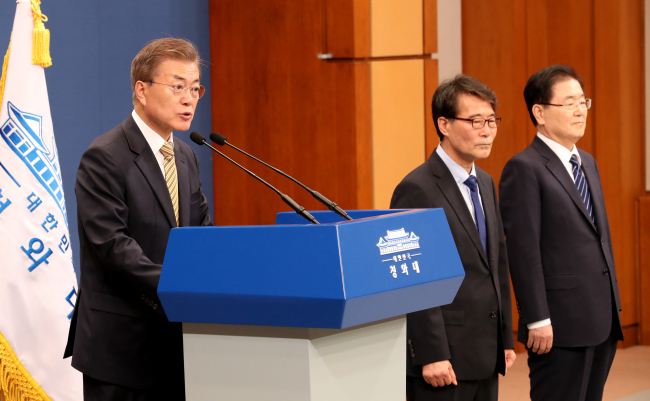The new liberal South Korean administration’s approach to North Korea is raising concerns about a possible clash with the international community’s increasingly tougher stance.
Even before he took office, President Moon Jae-in has emphasized the need to engage North Korea. During his campaign, Moon pledged to reopen and expand Kaesong industrial park located just north of the border. He also said that he was open to meeting Pyongyang’s leader under the right circumstances.
 |
President Moon Jae-in (Yonhap) |
North Korea, however, has stepped up its provocations. Since Moon took office on May 10, Pyongyang has conducted two ballistic missile launches and has also been linked to the recent ransomware attacks. It was revealed that UN officials monitoring North Korea’s sanction violations have been subjected to sustained cyberattacks from as yet unidentified hackers.
Pyongyang’s recent actions have prompted stern responses from the international community.
On Monday, the UN Security Council condemned the latest missile launch and warned that it will seek additional sanctions against its regime. The latest launch was conducted Sunday, and Kim Jong-un has since been reported as having approved the weapon to be deployed. The launch was the second since Moon’s inauguration and the eighth so far this year.
The UN Security Council is scheduled to convene an emergency meeting Tuesday. Ahead of the meeting, major powers’ representatives to the UN have called for stronger measures.
The UK’s UN Ambassador Matthew Rycroft said that his country supports the latest UN Security Council statement and “urgent work to bring the council together to impose additional measures.” The UK’s position was echoed by France’s UN Ambassador Francois Delattre, who expressed hopes for stronger measures.
In Seoul, however, Moon’s stance on Pyongyang appears to be already influencing the operations of the related government organizations.
The Ministry of Unification said Tuesday that civilian groups had applied for permits for contact with North Korean entities and that it was reviewing them “flexibly.”
“Civilian exchange (with North Korea) and other major issues are being reviewed flexibly within the boundaries of the sanctions,” a Unification Ministry official told reporters Tuesday.
According to the ministry, the applications are mainly for indirect contact for humanitarian activities.
The official also said that sanctions imposed by Seoul and the international community will be considered and that measures currently in place will be eased in accordance with progress in resolving North Korean nuclear issues.
The new administration’s emphasis on inter-Korean dialogue has also prompted news reports that it is seeking the help of the Vatican in arranging a summit with Pyongyang.
The report, which has been denied by the presidential office, claimed that Moon’s letter to Pope Francis contained a request for his aid in arranging a summit meeting with North Korean leader Kim Jong-un.
The daily quoted Moon’s special envoy to the Vatican, Archbishop Hyginus Kim Hee-joong, as saying that the president’s letter contained such a request and that he would deliver the letter Tuesday or Wednesday. The South Korean archbishop was also quoted as saying that Moon is requesting the Vatican to serve as a third party moderator in normalizing inter-Korean relations.
By Choi He-suk (
cheesuk@heraldcorp.com)







![[From the Scene] At this Starbucks, you need ID: Franchise opens store with view of North Korea](http://res.heraldm.com/phpwas/restmb_idxmake.php?idx=644&simg=/content/image/2024/11/29/20241129050068_0.jpg)
